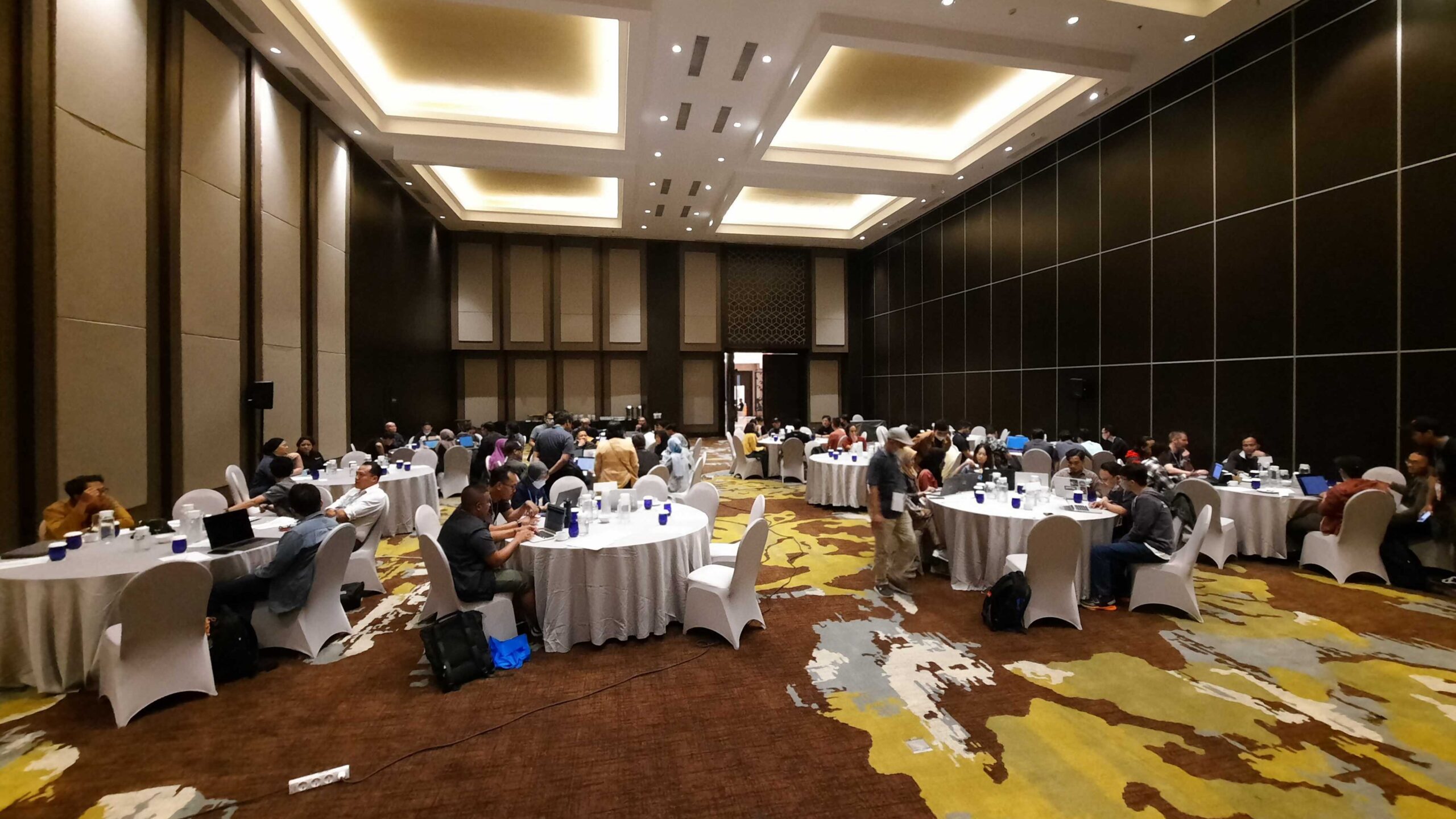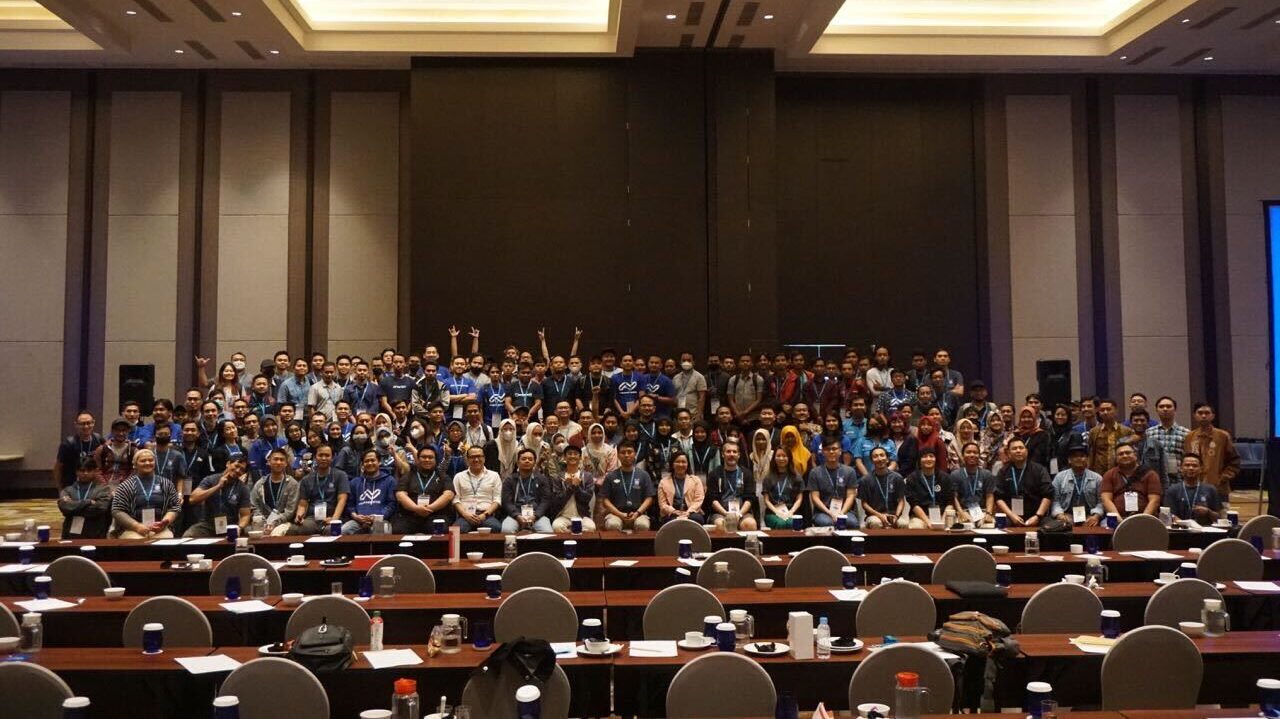WordCamp Gresik 2022 is the first WordCamp held in Indonesia after the pandemic. It’s also the first WordCamp I’ve ever attended.
The event was held at Aston Inn, Gresik, on 9-10 November 2022. Gresik is an industrial city not far from Surabaya. Participants include developers and students who came from various places in Indonesia.
My participation here was mainly to represent the company I work at, which was one of the gold sponsors of the event and did sponsor my ticket for the event. I attended both days, with the first day mainly for the speaker sessions and the second day focused on Contributor Day.
The Speaker Sessions
The first day started with participant registration, followed by the opening ceremony before proceeding to the speaker sessions. There are two tracks/halls for the session, with the 1st track for non-technical presentations and the 2nd track for technical ones.
I attended all the 2nd track sessions. Here are the highlight and summary from each speaker:
Ahmad Faizin Karimi
Ahmad is working with the local Gresik government to develop its e-government system. Nationally, Gresik is the third-best local government based on the e-government index.
Ahmad explained how complex can a government website can be and how challenging it is to create a CMS-based website that can provide real-time information accurately and quickly. He also stressed the importance of collaboration between developers and government bodies to build a good e-government system.
Ian Hung
Ian is one of the international speakers in WordCamp Gresik, and he presented the importance of optimizing Core Web Vitals on WordPress websites. He explained about three main core web vitals; Largest Contentful Paint (LCP), First Input Delay (FID), and Cumulative Layout Shift (CLS).
He also explained the difference between lab data and field data when it comes to core web vitals measurement. In a nutshell, lab data is a one-time test, while field data is a real-user monitoring based on the data gathered through Chrome User Experience Report (CrUX).
Google Site Kit and Performance Lab plugins are mentioned as some of the solutions to improve a WordPress site’s core web vitals.
Yudhi Satrio
Yudhi presented the importance of accessibility in theme and plugin development. He started with the stats of Indonesian internet users; 119.4 million users, among them, are 18.2 million elderly people and 3.5 million visually-impaired people.
These stats laid the foundation for why accessibility is important. Honestly, when I hear about accessibility, “aria-label” and “alternative text” are what come to my mind. But, Yudhi explained more than that. A small thing like a great onboarding experience, such as one we can find on WooCommerce, is a great example of how it can improve accessibility. Other than that, text, instruction, and easy-to-read documentation play major roles in improving accessibility.
Niels Lange
Niels is a JavaScript engineer, and he demonstrated how WP-CLI could speed up the process of setting up a testing environment. In this case, a WooCommerce test site.
He started this presentation with the problem; demonstrating how frustrating it is to build a test site with repetitive tasks such as installing plugins and adding demo content. It is a very time-consuming process. In fact, he spent around 10 minutes just demonstrating the problem.
And then, he presented the WP-CLI commands he’s developed. With only a few commands on WP-CLI, he managed to replicate all those repetitive tasks (and do more) in just a minute!
His WP-CLI commands are available on his GitHub repository.
Kharisma Sundaram
Kharisma presented WordPress security, vulnerabilities, and firewalls. She started with the important stats; 95% of hacked WordPress sites are caused by vulnerabilities, while password leak only accounts for 5% and web host security for less than 1%.
Having a firewall system is one of the WordPress security measures, but there are three types of firewalls: cloud-based, WordPress plugin, and network firewall. She stressed the importance of having a plugin-based firewall, as it can protect you from WordPress-specific attacks and vulnerability exploitation.
Testing a firewall involves penetration testing, but she provided these tips to choose a firewall service without doing a test:
- Does the firewall use OWASP top ten
- How often is it updated
- Check the review logs
Rio Astamal
Rio’s presentation about serverless WordPress is probably the most technical – at least for me.
He explained what a serverless architecture is and how it can improve a website’s uptime by spreading the traffic load into several containers.
Luckily, he did a demonstration on how to set up a serverless WordPress using Amazon Web Services (AWS) and let us experience it first-hand. He showed the steps to create the infrastructure using Amazon’s platform, and he prepared a WordPress site for demonstration.
Next, he simply asked the attendees to visit the demo WordPress site. He’s already tweaked the site, so we can see from which IP address the site is served.
Carl Alberto
Carl presented site optimization by using edge computing – distributing data to a closer data center to reduce response time.
Using a Content Delivery Network is one of them – a service that spreads the website content to a distributed network of data centers to make it closer to visitors’ locations.
He also explained other optimization methods, such as image optimization and cache utilization.
Vicky Laurentina
Vicky was the final speaker, and she presented about entrepreneurship as a blogger. She herself is a blogger who earns money by writing sponsored content.
She explained two business models of a personal blogger. The first one is generating money from sponsored posts. In this model, the blogger earns payment from a product and/or service provider to write review content. This type of content helps spread brand awareness and generate customers for the business owner.
The second model is writing content that contains affiliate links. When a reader clicks the link and make a purchase through that link, the blogger will earn commissions.
Whichever the model, Vicky stressed the most important factors of successful blogs – topic mastering and search engine optimization (SEO).
Topic mastering makes your content more credible, helping you gain more authority in the niche. SEO, on the other hand, helps your blog to gain a higher rank on the search engine results pages, allowing your blog to be visible to more searchers.
Contributor Day

The second day of WordCamp Gresik is Contributor Day. It’s a well-known session among WordPressers and WordCamp attendees – this is where we all sit together and contribute to the WordPress project.
I’ve been contributing WordPress in the documentation and polyglots teams. But, since there’s no table for documentation, I joined the polyglot team.
There are only four people at the polyglot table. I had the chance to work at the same table with Kharis Sulistiyono, one of the locale managers for Indonesia. But there’s more. He’s appointed me to become one of the General Translation Editors (GTE)! So now I’m one of 10 people who can review and approve translations for the Indonesian locale.
During the contributor day session, I started my new role as a GTE; reviewing and approving translations. During the course of 3 hours, I reviewed over 40 strings. Doesn’t sound much since, obviously, I had to learn more about the style guide and approval criteria.
However, we’ve managed to make progress for WordPress 6.1 translation project, from 95% translated to 99% translated now!
Wrap Up
As the first WordCamp for me, it’s been a super great experience. Other than gaining new insights from the main event, I met and got connected with many great people in the WordPress community. Niels Lange, Ian Hung, and Kharis Silistiyono, just to name a few.
I’m pretty sure this won’t be the one and only WordCamp event for me. Whenever I get the chance to attend another one, I’ll definitely do it!

Leave a Reply